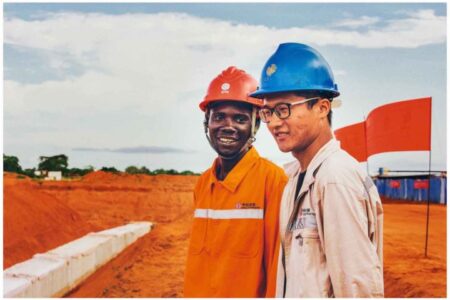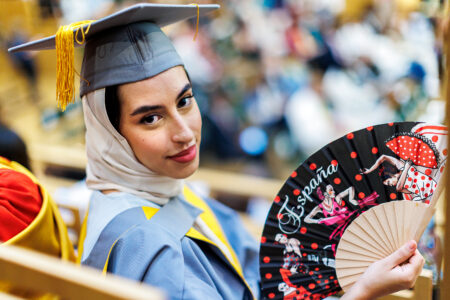For many, the path to finding a calling can be as unexpected as it is profound. Julia Cottrell, a ‘third-culture kid’ raised in the Netherlands, found hers through a television show presented in one of her university classes. The show, “Door het Hart van China” (Through the Heart of China) by Ruben Terlou, which showcased the intricate relationship between religion, culture, and medicine in a Chinese hospital, fascinated Cottrell, leading her to pursue a degree in medical anthropology and mental health.
“I decided to take the mental health side of Medical Anthropology after learning about how important lived experience is in treatment,” she says. At SOAS University of London‘s Department of Anthropology and Sociology, her interest found fertile ground.
A world-renowned department
Ranked sixth in the UK and 19th in the world for Anthropology according to QS World University Rankings 2024, the department is home to MA programmes that delve into the theories and practices that shape what it means to be human in an ever-changing world, equipping students to grasp the diverse perspectives, practices, and knowledge systems that characterise life on the planet.
Choosing SOAS for her MA in Medical Anthropology and Mental Health proved to be an excellent decision for Cottrell. SOAS is a leading research-driven university in the UK, home to anthropologists and sociologists specialising in Asia, Africa, or the Middle East, their global interconnections, and their diasporas. This diverse, multilingual and engaged community exemplifies the university’s legacy of exceptional regional expertise in languages, cultures, and politics.

Cottrell plans to start a career in suicide prevention and she believes her success in this field relies on the knowledge and skills gained from her MA programme. Source: SOAS University of London
“It was important to me that I would be supported in my study, and SOAS has a strong disability assistance team,” Cottrell says. “Additionally, I wanted to learn from people who were at the forefront of the field in a large, multicultural city. Other medical anthropology programmes I was interested in didn’t focus on mental health, and I felt that SOAS’ inclusion of this topic would positively benefit my understanding of both physical and mental health treatments.”
Comprehensive and impactful
The SOAS MA in Medical Anthropology and Mental Health delves into the complexities of human suffering and the diverse approaches to healing and treatment. It provides students with anthropological tools to tackle the key health and mental health challenges of our times. Drawing on ethnographic research, clinical knowledge, lived experience, and cross-cultural comparisons, it explores how health is shaped by cultural, political, social and historical forces in various parts of the world, like climate change, colonialism, displacement, and inequalities based on race, gender, and sexuality.
This approach to medical anthropology and mental health aligns perfectly with Bankole Oluwafunminiyi Osibote’s vision. “It provides me with a valuable set of points to begin with, whenever issues need analysing formally,” he says. “To begin from this perspective entails intimacy with often unmentioned socioeconomic determinants of health, which can sometimes trap individuals in predetermined fates. It is a good place from which to start assessing practicalities and peculiarities of circumstances [that] I may become involved in.”
Students also gain insights into the implications of ongoing cultural and technological shifts, along with the ethical considerations surrounding diverse healing philosophies and practices. This allows them to engage with current affairs and global issues related to mental health, inequality, conflict, and justice. They can even acquire practical experience through short work placements — a perk Cottrell can certainly vouch for.
During her “Directed Practical Study” module, she volunteered at the Seafarers Hospital Society in Greenwich, London. “Part of my duties involved researching ‘everyday things’, such as National Kidney Day, so we could make social media awareness posts for them,” she shares. “I also participated in meetings with representatives from organisations like Togetherall, a web and mobile app that supports mental health.”
A community of support
This MA programme is led by a diverse group of anthropologists who are active participants in the recently established Centre for Anthropology and Mental Health Research in Action (CAMHRA). This Centre is engaged in collaborative research with the NHS, voluntary/private sector partners, and international clinical and public health organisations in the field of mental health. Importantly, CAMHRA nurtures a vibrant community, allowing MA students to benefit from research-led teaching, guest lectures, events, and placements.
Between the Department of Anthropology, CAMHRA and the MA in Medical Anthropology and Mental Health, studies gain unparalleled opportunities for support and growth.
“I haven’t experienced such a supportive group of educators anywhere else,” Cottrell says. “They genuinely want you to succeed, not only academically but also as a person. My thesis supervisor has been incredibly helpful, clearly outlining expectations. I feel confident that I’m set up for success because of them.”
Interested? Click here to learn more about the MA in Medical Anthropology and Mental Health at SOAS University of London.
Follow the SOAS University of London on Facebook, X, LinkedIn, Instagram, and YouTube












